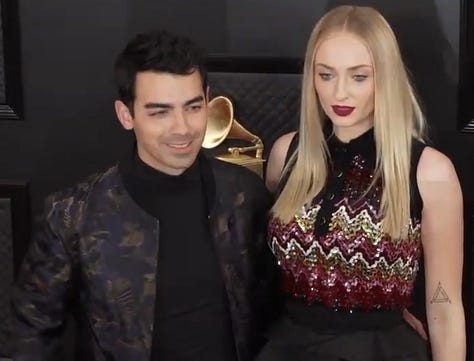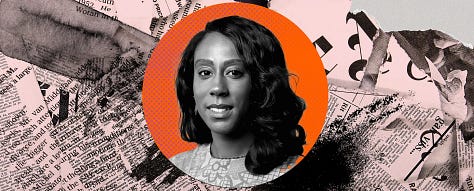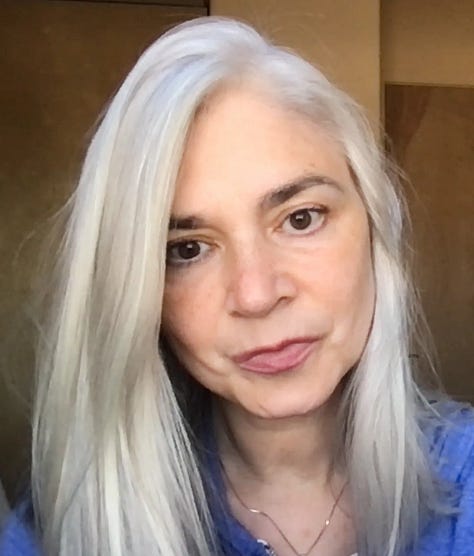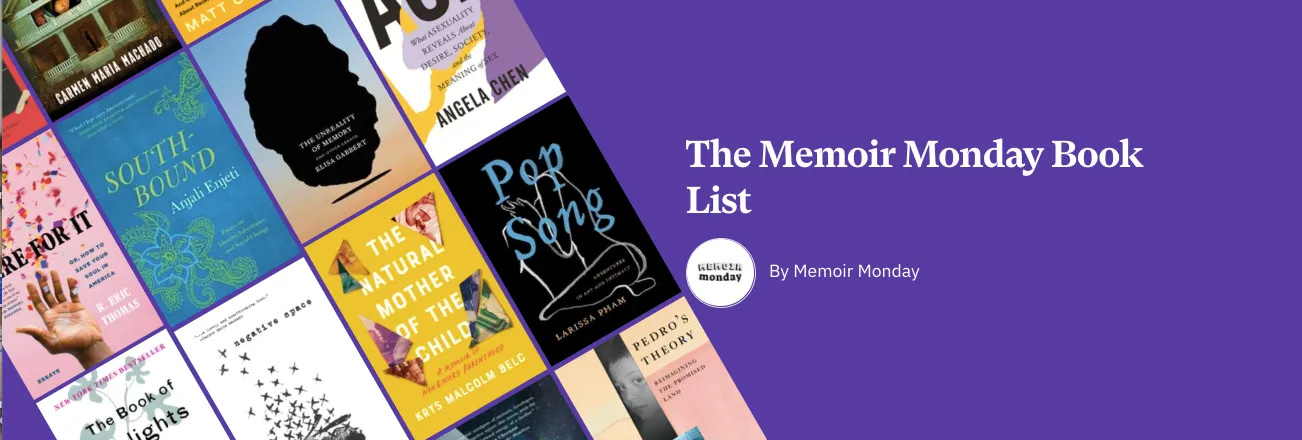Welcome to Memoir Land—a newsletter edited by
, now featuring three verticals:Memoir Monday, a weekly curation of the best personal essays from around the web brought to you by Narratively, The Rumpus, Granta, Guernica, Oldster Magazine, Literary Hub, Orion Magazine, The Walrus, and Electric Literature. Below is this week’s curation.
First Person Singular, featuring original personal essays. Recently I published “On Silence (or, Speak Again)” by
. A new essay is coming soon.
*Submissions are currently paused for First Person Singular. I’ll do a limited submission period this fall. Stay tuned…*
The Lit Lab, featuring interviews and essays on craft and publishing. It is primarily for paid subscribers. Recently I published the second installment of “The Prompt-O-Matic” series.






Essays from partner publications…
Maternal Vertigo: On Chaos, Childcare, and Civilizational Collapse
by Molly Lynch
“Sometime in the early weeks after becoming a mother, it occurred to me that by giving birth to a baby I’d also given birth to chaos. I don’t mean that my child embodied chaos. It was more like when the baby exited my body, a dark, swarming force rushed in. By wanting to protect someone, I’d invited into my life all that I could never protect him from. I’ve since thought that part of what changes you when you become a parent has to do with the way you encounter this contradiction: at the very moment that you take on the greatest act of caring, you discover how powerless you are.”
A Boat Ride to the Confluence of the Two Niles
by Isma’il Kushkush
“Known as the longest kiss in history, al-Mugran is a place of natural beauty and romantic symbolism where the calm and clear waters of the White Nile from the south meet the muddier, darker and rushing waters of the Blue Nile from the east. Al-Mugran’s name comes from Arabic for ‘the junction’ or ‘the confluence’, where, after ‘kissing’, the differently colored battling currents remain visible before flowing united.”
In Defense of Sophie Turner, It’s Nearly Impossible to Be a “Good Mother
by Alicia Andrzejewski
“Generations of bad mothers have taught me that, no matter what Turner may or may not have been caught doing on a Ring camera, the dictates of motherhood are painful—violent, even—to bear. Sophie Turner has privileges many mothers cannot even imagine and yet even she cannot escape these narratives, cannot measure up to what patriarchy deems a good, successful mother.”
The Forest Clearing
by Yomi Wrong
“I feel pulled to a clearing. Now I’m distracted. I have an urgency to explore. When we break to go off wandering, I bolt in the direction that calls me. Rolling up a slope, my wheels struggle to grip the forest floor, and I panic, fearing I’ll get stuck. Keep going.”
Burning it Down
by
“Since my late twenties, when my hair began to go silver, I’d colored it assiduously, like all the women in my family—like all the Latinas I knew. Dark hair was a marker of identity, of youth, of femininity, of our culture.” (Editor’s note: This essay was featured when it first was published in 2022. Re-upping now because it received notable mention in The Best American Essays 2023, edited by Vivian Gornick.)
What It Took to Write the Personal Essay That’s Setting the Web on Fire
by Jesse Sposato
“Every once in a while I start reading a story and know right away that it’s going to be the kind of piece that truly grabs me and allows the rest of the world to fall away while I read. Jenisha Watts’s new essay for The Atlantic, ‘I Never Called Her Momma: My childhood in a crack house,’ is one of those stories. And I wasn’t alone — the entire internet has been ablaze with words of adoration since the essay was first published earlier this month.” (Editor’s note: This is not an essay, but an interview about one, which was featured in this newsletter two weeks ago.)
Essays from around the web…
Ludicrous
by Cristina Olivetti
“There are so many lasts we don’t remember. I don’t remember the last time Graham drove the S-80...I do know I kept the car for a while after Graham could no longer drive it. You can ask my friends—I drove Ludicrous for all of them. But it wasn’t that fun. People felt nauseous and knocked around. I get it. They weren’t falling apart like we were, so that thin disintegrating feeling wasn’t exactly hilarious for them...”
Wanderings
by Sydney Lea
“One event marred the celebration when I was ten. Just before lunch, I climbed a big rock and put my hand on a copperhead snake that had been warming winter out of its system at the flattened top. I remember to this day how intensely painful its bite was. After a rattling trip in Dad’s ’48 Chevy wagon to a doctor’s office in a postage stamp-sized town nearby, I was injected with anti-venin and, the poisonous bite’s only memorable effect, apart from that pain, was a stiff neck for ten hours or so. I do recall that I’d never loved my father as much as I did each time I woke up; there he’d faithfully be right through till dawn, squinting in the half-light at some magazine, his chair barely rocking.”
Just a Normal Girl, Hiding From the Building Inspector
by Micaela Macagnone
“I was 15 the first time it happened…I was staring at the empty apartment and wondering what would happen if the police figured out what my dad had done…For years, my family had been living in a commercial building — illegal for residential use — above my father’s Pilates studio. He had opened it in 1998 at Scheffel Hall, a New York City landmark on Third Avenue dating to 1895.”
So Fierce Is the World: On Loneliness and Philip Seymour Hoffman
by Richard Deming
“The desolation of loneliness, like the connected problems of substance abuse and depression, comes from the feeling that the experience—when one is in it—will never end. That is why, sometimes, people choose to end it for themselves. If we are to keep going, push through, or slip around it, I believe we must reinvent loneliness in order to survive it. I have been trying to do this my whole life.” (h/t
.)SuperBabies Don’t Cry
by Heather Lanier
“Here’s the thing. If you buy into a false narrative that the body is controllable, that illness can always be prevented, then by proxy you are left with a disturbing, damaging, erroneous conclusion: the belief that a person’s disability is their fault.”
How to Prepare for A Difficult Conversation
by Ethan Gilsdorf
“Conjure the person with whom you need to discuss this urgent matter—the spouse, the sibling, the in-law, the outlaw, the ex-, the coworker, the offspring, the former best friend, the dead parent. It’s simple. Watch their drooping face, age spots, shaky jaw, deliberate way of speaking, how they hide behind their sunglasses and never make eye contact, and let it all enter the crenellations of your agitated brain.”
The Power of the Cookie
by Blair Glaser
“I didn’t want any more cookies. They wouldn’t be warm. They wouldn’t include Ava’s ironic presence. What I could take was the mutual hope we had given each other just by living our lives, and the incredible reflection that all that grueling personal work I did to heal had actually inspired someone else without me doing anything except eating one cookie: the cookie that would change my life.”
When Leaving Isn’t the Hardest Part
by Dr. Tamara MC
“We couldn't learn how to stand up for ourselves, setting us up for a lifetime of abuse. This is what fundamentalist communities teach girls. Because our bodies belonged to our parents, church, and eventually our husbands, they never belonged to us. The title of the Duggar docuseries includes the word "secrets," but I hope by now it's no surprise that fundamentalist religious environments can be the grimiest of all. Despite the Duggars' squeaky-clean appearance and our contrasting grubby one, we both shared dark secrets.”
How We Carry the Weight of It
by Will McMillan
“We arrive in the raspberry fields when it’s dark. It’s dark when we pile out of our secondhand pickup. My father, my mother. My brother and me. It’s dark when we start walking the rutted, sopping dirt road that cuts through the field, where we meet and melt into a vast sea of bodies, the dozens of families who’ve piled out of their secondhand pickups, their cars. All of us merging, ambling forward, a sleepy, reluctant, unremarkable herd. All of us, in the dark.”
🚨Announcements:
📢 Submissions for ’s second annual Memoir Prize are open now.
“From Tuesday, September 26, 2023, through Thursday, November 30, 2023, Narratively is accepting entries for our 2023 Memoir Prize. We’re on the hunt for revealing and emotional first-person nonfiction narratives from unique and overlooked points of view. The winning submission will receive a $3,000 prize and publication on Narratively.”
📢 Take my Skillshare workshop on blending the individual and the collective in your essays!
📢 Attention Publications and writers interested in having published essays considered for inclusion in our weekly curation:
By Thursday of each week, please send to memoirmonday@gmail.com:
The title of the essay and a link to it.
The name of the author, and the author’s Twitter handle.
A paragraph or a few lines from the piece that will most entice readers.
Because of data limits for many email platforms, going forward we will only include artwork from our partner publications. No need to send art.
*Please be advised, however, that we cannot accept all submissions, nor respond to the overwhelming number of emails received. Also, please note that we don’t accept author submissions from our partner publications.
You can also support Memoir Monday—and indie bookstores!—by browsing this Bookshop.org list of every book that’s been featured at the Memoir Monday reading series. It’s a great place to find some new titles to add to your TBR list!





